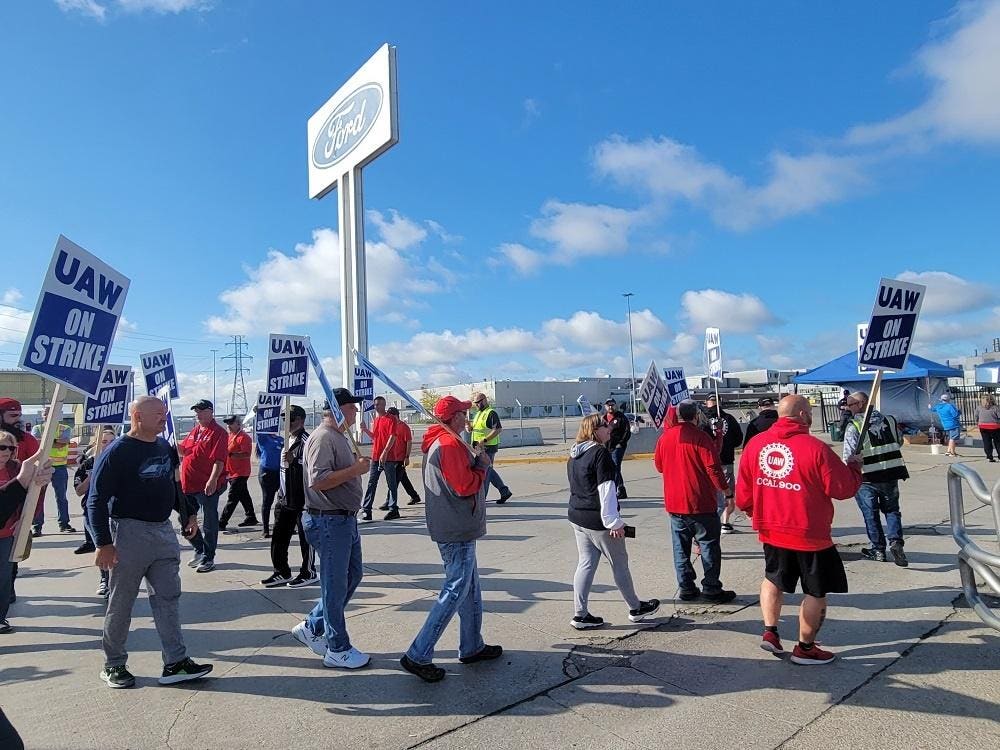The six-week strikes against the Detroit Three automakers by the UAW will create more pressure on dealers and increase tension between them and the auto companies predicted the CEO of online vehicle marketplace TrueCar.
Jantoon Reigersman also blamed some of the sluggishness on electric vehicle sales on dealers who aren’t yet prepared to sell battery-powered cars and trucks in a wide-ranging interview in conjunction with release, Monday, of the website’s third quarter financial results,
Reigersman was elevated to CEO at TrueCar in June as part of a restructuring aimed at reducing annual expenses by more than $20 million and eliminated 102 positions, or 24% of the companies headcount. The website, which acts as a matchmaker of sorts between those shopping for new or used vehicles and dealers, joined the many businesses that suffered downturns during the Covid-19 pandemic.
“We have surpassed our guidance,” the company said in a letter to shareholders. “We are back to year-over-year revenue growth for the first time in nine quarters and achieved positive adjusted EBITDA a quarter earlier than originally indicated in our previous guidance.”
For the quarter, TrueCar reported a net loss of $7.9 million compared with a $77.1 million loss during Q3 of 2022 on revenues of $41.1 million up from $39.1 million in the July to September period a year ago.
With the combination of increased revenues and narrowing losses the company told shareholders it is pursuing by the end of 2026 excess of $300 million annual revenue and greater than 10% free cash flow.
“I think we’re in good shape,” Reigersman said in the interview.
Looking at the effects of the strikes against the Detroit Three automakers, Reigersman noted that once full production resumes at assembly plants hit by the walkouts the dynamics between companies and dealers will change.
“I think as soon as these players can do that the burden of the responsibility shifts to the dealer, and I think that’s tricky,” Reigersman said. “I think the repercussion is that the end person that suffers is the dealer because the OEMs will have to solve the higher unit economic costs to produce more effectively and the burden will then be on the dealer to sell.”
Reigersman looks at that added sales pressure on dealers as an opportunity in the long-term for his company to help facilitate those deals, adding, “actually net-net it should actually be to our benefit. But I do think that it will provide a greater tension between the OEMs and the dealers themselves.”
In that same vein, Reigersman acknowledges the ongoing affordability issue for many consumers who find the price of a new vehicle is out their reach. During the pandemic when vehicle production was halted or slowed, dealer inventories were low making discounts and other incentives unnecessary.
That’s all changed. Incentives have returned but finance interest rates are high somewhat negating the discounts. For that reason, Reigersman believes a sales method that largely fell out of favor should be revived.
“In a high interest rate world OEMs, and captives in particular, will have to become more creative in subsidizing the cars or at least the financing of the cars in some shape or form,” Reigersman said. “So I do think that leasing will start coming back much more than it used to in the last two years.”
As for the slowdown in EV sales, leading General Motors Co. and other automakers, to reassess their product plans, Reigersman says customers may be reluctant to switch due to well-known reasons such as range or charging anxiety or price, but the dealer also plays a role in failure to close deals on electric vehicles by not knowing how to adequately address customer concerns.
“The customer thinks, I’m gonna consider an EV. Where do I install a charger at home or who can do that? The dealer, not having the ability or articulation to actually say how to do that or whom to call, results in a reluctance to engage,” said Reigersman.
He also points out many dealers experience high turnover of their sales staff, leading to inexperienced personnel simply not experienced enough to address customer questions or concerns regarding EVs.
“So if that person isn’t well trained they automatically shift to an internal combustion car as opposed to an EV car because, frankly, they don’t even know what to say,” Reigersman observed.
Looking ahead at TrueCar’s future, Reigersman believes the company can recapture a lot of the marketshare it lost over the past few years by evolving to more than a simple sales lead generator for its dealers but by expanding services to where the website is responsible for 20% to 30% of a dealership’s business.
“At the end of the day it’s about matchmaking,” said Reigersman. “Truly being a marketplace where you match make the consumer and the dealer and make sure that both of them win.”
Read the full article here





